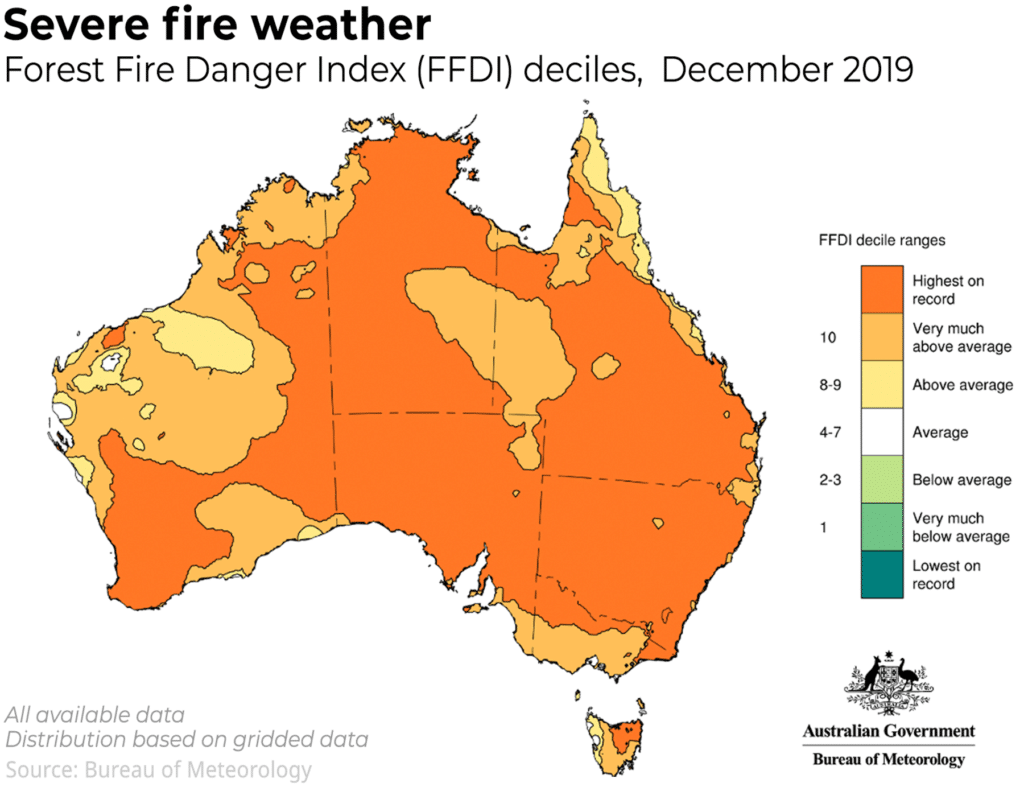
This is what comes after climate grief
Opinion + AnalysisClimate + EnvironmentPolitics + Human RightsRelationships
BY Ketan Joshi The Ethics Centre 21 JAN 2020
I can’t really lie about this. Like so many other people in the climate community hailing from Australia, I expected the impacts of climate change to come later. I didn’t define ‘later’ as much other than ‘not now, not next year, but some time after that’.
Instead, I watched in horror as Australia burst into flames. As the worst of the fire season passes, a simple question has come to the fore. What made these bushfires so bad?
The Bureau of Meteorology confirms that weather conditions have been tilting in favour of worsening fire for many decades. The ‘Forest Fire Danger Index’, a metric for this, hit records in many parts of Australia, this summer.
The Earth Systems and Climate Change Hub is unequivocal: “Human-caused climate change has resulted in more dangerous weather conditions for bushfires in recent decades for many regions of Australia…These trends are very likely to increase into the future”.

Bushfire has been around for centuries, but the burning of fossil fuels by humans has catalysed and worsened it.
Having moved away from Australia, I didn’t experience the physical impacts of the crisis. Not the air thick with smoke, or the dark brown sky or the bone-dry ground.
But I am permanently plugged into the internet, and the feelings expressed there fed into my feed every day. There was shock at the scale and at the science fictionness of it all. Fire plumes that create their own lightning? It can’t be real.
The world grieved at the loss of human life, the loss of beautiful animals and ecosystems, and the permanent damage to homes and businesses.
Rapidly, that grief pivoted into action. The fundraisers were numerous and effective. Comedian Celeste Barber, who set out to raise an impressive $30,000 AUD, ended up at around $51 million. Erin Riley’s ‘Find a Bed’ program worked tirelessly to help displaced Australians find somewhere to sleep. Australians put their heads down and got to work.
It’s inspiring to be a part of. But that work doesn’t stop with funding. Early estimates on the emissions produced by the fires are deeply unsettling. “Our preliminary estimates show that by now, CO2 emissions from this fire season are as high or higher than the CO2 emissions from all anthropogenic emissions in Australia. So effectively, they are at least doubling this year’s carbon footprint of Australia”, research scientist Pep Canadell told Future Earth.
There is some uncertainty about whether the forests destroyed by the blaze will grow back and suck that released carbon back into the Earth. But it is likely that as fire seasons get worse, the balance of the natural flow of carbon between the ground and the sky will begin to tip in a bad direction.
Like smoke plumes that create their own ‘dry lightning’ that ignite new fires, there is a deep cyclical horror to the emissions of bushfire.
It taps into a horror that is broader and deeper than the immediate threat; something lingers once the last flames flicker out. We begin to feel that the planet’s physical systems are unresponsive. We start to worry that if we stopped emissions, these ‘positive feedbacks’ (a classic scientific misnomer) mean we’re doomed regardless of our actions.
“An epidemic of giving up scares me far more than the predictions of climate scientists”, I told an international news journalist, as we sat in a coffee shop in Oslo. It was pouring rain, and it was warm enough for a single layer and a raincoat – incredibly strange for the city in January.
She seemed surprised. “That scares you?” she asked, bemused. Yes. If we give up, emissions become higher than they would be otherwise, and so we are more exposed to the uncertainties and risks of a planet that starts to warm itself. That is paralysing, to me.
It is scarier than the climate change denial of the 2010s, because it has far greater mass appeal. It’s just as pseudoscientific as denialism. “Climate change isn’t a cliff we fall off, but a slope we slide down”, wrote climate scientist Kate Marvel, in late 2018.
In response to Jonathan Franzen’s awful 2019 essay in which he urges us to give up, Marvel explained why ‘positive feedbacks’ are more reason to work hard to reduce emissions, not less. “It is precisely the fact that we understand the potential driver of doom that changes it from a foregone conclusion to a choice”.
A choice. Just as the immediate horrors of the fires translated into copious and unstoppable fundraising, the longer-term implications of this global shift in our habitat could precipitate aggressive, passionate action to place even more pressure on the small collection of companies and governments that are contributing to our increasing danger.
There are so many uncertainties inherent in the way the planet will respond to a warming atmosphere. I know, with absolute certainty, that if we succumb to paralysis and give up on change, then our exposure to these risks will increase greatly.
We can translate the horror of those dark red months into a massive effort to change the future. Our worst fears will only be realised if we persist with the intensely awful idea that things are so bad that we ought to give up.
Ethics in your inbox.
Get the latest inspiration, intelligence, events & more.
By signing up you agree to our privacy policy
You might be interested in…
Opinion + Analysis
Politics + Human Rights, Relationships
Ask an ethicist: do teachers have the right to object to returning to school?
Opinion + Analysis
Relationships
Israel Folau: appeals to conscience cut both ways
WATCH
Politics + Human Rights
James C. Hathaway on the refugee convention
Opinion + Analysis
Politics + Human Rights, Society + Culture




